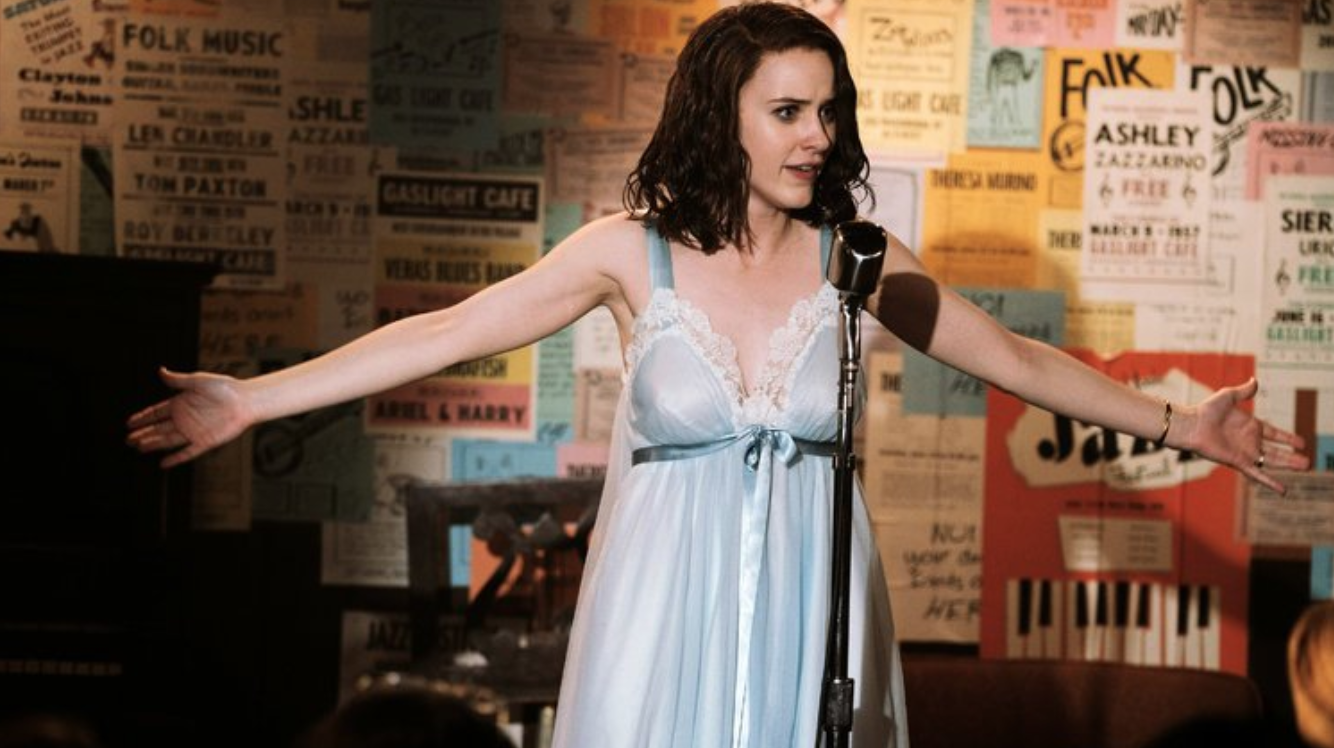Once again speaking to the trend in pop culture of either reverting well into the past or much further into the future, one of the latest critically acclaimed TV series finds us far back in time, 1958, to be exact. The fourth series from TV show creating goddess Amy Sherman-Palladino–best known, of course, for helming Gilmore Girls—The Marvelous Mrs. Maisel follows the eponymous Miriam “Midge” Maisel as she navigates her unpredictable actions in the wake of being abruptly and very unexpectedly left by her husband of four years, Joel (Michael Zegen)–and the night before Yom Kippur, no less. Which she managed to get the rabbi to come to after four years (since the day of their wedding reception, to be exact, when she “joked” about there being shrimp in the egg rolls) of being on his shit list. In short, it’s terribly timed–much like all of Joel’s attempts at standup comedy, of which he performs often at The Gaslight (later to be made iconic by Bob Dylan). Miriam, however, remains blindly faithful to Joel’s dream of becoming a comedian, a dream he soon realizes is made of pipe after a night of bombing while using the same tired joke he stole from Bob Newhart anyway.
Back at home, Joel’s sudden crisis of identity escalates when he asks, “Did you ever think you were supposed to be something and you suddenly realize you’re not?” Miriam, quips, “Yes. Married.” Joel continues packing her suitcase, saying, “That’s good, you’re good…I’m never gonna be a professional comedian, Midge. Never.” She confirms, “No, of course not… You have a job.” He pauses from packing to explain, “Comedy was a dream. Do you know what a dream is? A dream is what keeps you going in a job you hate!” So it is that the dialogue and the plot point of abandonment itself mirrors the style of Nora Ephron, specifically her most notorious book, Heartburn–the fictionalized account of her husband Carl Bernstein’s affair with Margaret Jay, and while Ephron was pregnant with their second child, no less.
The verbal sparring that Ephron was renowned for showcasing in her novels, essays and screenplays is alive and well in the universe of The Marvelous Mrs. Maisel, most of the episodes of which were either written by Amy Sherman-Palladino herself, or her oft co-collaborator and husband, Daniel Palladino. Maybe it has to do with both women being born in New York City and, of course, Jewish, and the natural predisposition toward auditory pugilism that comes from that, but whatever the reason, each writer possesses a wizardry with making verbosity not only hilarious, but also completely authentic-sounding. Miriam so often feels like the sort of neurotic, heart of gold character that could have easily been the lovechild of Sally Albright and essentially any of the characters in Mixed Nuts. And though, to be sure, Amy Sherman-Palladino very much has her own voice, there can be no denying the Ephron influence. Herself forced to go up against the very misogyny and small-mindedness that Miriam does in the comedy world in her fight to become a journalist, there also lies a certain tinge of another Amazon series (prematurely and ill-advisedly cancelled), Good Girls Revolt, featuring Ephron herself as a character, and one of the first women to make a statement about not being relegated to glorified secretary.
Ah, and speaking of secretaries, that’s the other part of Joel’s decision to leave Miriam–for there’s always got to be a backup pussy waiting in the wings. Penny Pan, who becomes an early source of her impromptu standup routine fodder. For yes, Miriam, in her sudden destitution and bewilderment can only think of one place to go after getting drunk: The Gaslight. It’s there that Susie Meyerson (Alex Borstein) sees Mrs. Maisel in a new light, one that is no longer obstructed by the shadow of Joel’s terrible routine. In her first act, Miriam says of Penny, “She’s twenty-one and dumb as a Brillo pad. And I’m not naive. I mean I know men like stupid girls, right? But I thought Joel wanted more than stupid. I thought he wanted spontaneity and wit. I thought he wanted to be challenged, you know what I mean?” Eyeballing a man in the audience with his own Penny Pan, she adds, “You two are gonna be together forever.”
More electric than love at first sight, Susie knows she has to manage Miriam to hone the magic. But Miriam isn’t so convinced, bailing out Lenny Bruce (Luke Kirby, a far gentler version of the comic than Dustin Hoffman) to ask him if he loves it. Of course, he discourages her–especially someone who could do many other things with her looks–but it’s only then that she knows she has to do it. Talk about a career taboo for a woman in the 50s. And throughout the course of her rocky journey out of marriage, Miriam has her overbearing parents, Abe (Tony Shalhoub–incidentally, he was in the film version of Heartburn), and Rose (Marin Hinkle), to offer their own on-Ephron brand quirk and charm. And with the practically patented Ephron mantra of, “Everything is copy,” it’s very evident that Sherman-Palladino has taken this to heart in the way she portrays Miriam’s parents, no doubt composites of her own while growing up in the New York City of a bygone era.
With a greenlight for season two, the congenital standup comic we saw giving a joke-packed speech at her own wedding in the pilot episode is likely to evolve in even more interesting and Ephron-inspired ways. Let the undercutting how-to on patriarchal takedowns begin.






















